M-i-c-h-a-j-l-i-c-z-e-n-k-o. I spent time learning to print each letter and its order before I knew what my last name meant. It took me longer than others. After all, a typical last name doesn’t have 14 letters. When I was younger, I was confused about why my name was different. Why wasn’t anyone else’s?
I first questioned my dad about my name in the fifth grade. My teacher had assigned a family tree project to students to explore their family’s heritage. When I asked, he explained how my great-grandpa came from Ukraine with his family to start a life in America.
As a curious young fifth-grader, I wanted to know more. But I quickly learned that my family was almost as lost as I was. We have little information about our past in Ukraine further back than my great-grandpa. The name, Michajliczenko, soon became an alien entity, far from what I thought I knew of it. It was a name filled with a long past I knew nothing about.
More recently, with the ongoing Russian invasion of Ukraine, people have asked for my opinion on the matter or if I have family there I am worried about. But the truth is, my family cut their ties with Ukraine a long time ago.
My grandpa first came to America with his family in 1952. During this time, immigrants focused on embracing American culture to its fullest to avoid being seen as outsiders. Completely assimilating. My great-grandfather was no different. While he still had family in Ukraine, whom he visited from time to time, my great-grandpa took action to become an American: changing his name, converting from Ukrainian Orthodox to Baptist and not teaching his children the Ukrainian language.
My family chose to assimilate — one of the five methods of acculturation. In this method, immigrants enter a new country and choose to ultimately adopt the new culture without focusing on retaining the past culture. Assimilation requires that new immigrants have the same culture as others, with little to no differentiation.
American society has placed a large importance on the assimilation of immigrants. However, I want to tell you that this should not continue to be our goal — as a person whose family has experienced the effects of assimilation firsthand. Immigrants should not aim to become identical to others in society.
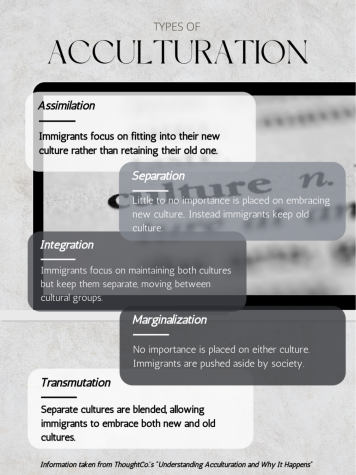
Instead, we should aim for a different method of acculturation: transmutation. Transmutation occurs when immigrants adopt a new culture and still hold their old one. Creating a blend of old and new cultures allows immigrants to retain their important traditions while also keeping a set of cultural norms in society. Therefore, other immigrants will not feel the need to Anglicize the spelling of their names or feel pressure to convert — all things that my family went through.
With the societal push to embrace cultural diversity, many have put effort into learning more about their heritage, even going as far as taking AncestryDNA or 23andMe tests to discover their family’s background. But, especially at this point, we must not return to believing that complete assimilation is our goal.
We need to advocate for balance. Encourage immigrants to combine our new and old cultures to create something new and beautiful. In my case, this means identifying as an American but also realizing and appreciating my Ukrainian ancestry. This is known as a transcultural identity. is created by combining facets of each culture into a singular, new one.
When individuals create a new culture by combining previous ones, they will feel less strained between separate cultures. There will no longer be competition between one culture and another because it has been tailored to each person’s needs. As a result, people will not feel the need to completely embrace only one culture and set aside the other for fear that they will be looked down upon.
My family may not have been lucky enough to create this new identity, but I hope that our story is a testament to others in similar situations. We are allowed to identify with multiple cultures at once. In my case, part American but still part Ukrainian.
Looking forward, we must change our long-held views regarding assimilation. It is no longer, and I dare say never has been, beneficial to creating a well-rounded society. Unlike others who have fallen prey to this ideology, I hope to be lucky enough to continue learning about my family’s past and lost culture. Perhaps even practice the balance that I preach and reverse the effects of a culture lost to assimilation.



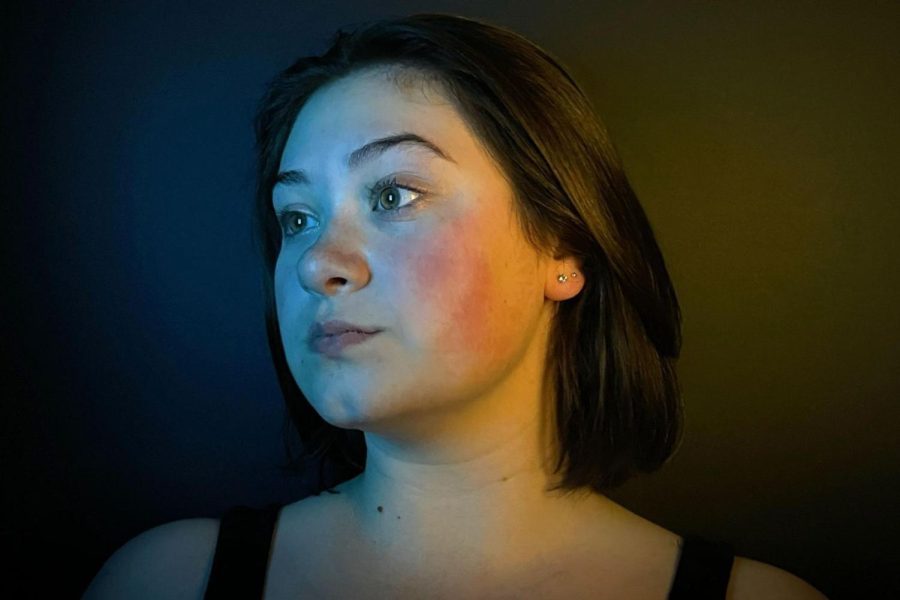
![Sophomore Maryem Hidic signs up for an academic lab through Infinite Campus, a grading and scheduling software. Some students enjoyed selecting their responsive schedule in a method that was used school-wide last year. “I think it's more inconvenient now, because I can't change [my classes] the day of, if I have a big test coming and I forget about it, I can't change [my class],” sophomore Alisha Singh said.](https://pwestpathfinder.com/wp-content/uploads/2025/10/DSC_0012-1200x801.jpg)
![Senior Dhiya Prasanna examines a bottle of Tylenol. Prasanna has observed data in science labs and in real life. “[I] advise the public not to just look or search for information that supports your argument, but search for information that doesn't support it,” Prasanna said.](https://pwestpathfinder.com/wp-content/uploads/2025/10/DSC_0073-2-1200x800.jpg)
![Junior Fiona Dye lifts weights in Strength and Conditioning. Now that the Trump administration has instituted policies such as AI deregulation, tariffs and university funding freezes, women may have to work twice as hard to get half as far. "[Trump] wants America to be more divided; he wants to inspire hatred in people,” feminist club member and junior Clara Lazarini said.](https://pwestpathfinder.com/wp-content/uploads/2025/05/Flag.png)
![As the Trump administration cracks down on immigration, it scapegoats many immigrants for the United States’ plights, precipitating a possible genocide. Sophomore Annabella Whiteley moved from the United Kingdom when she was eight. “It’s pretty scary because I’m on a visa. When my visa expires next year, I’m not sure what’s going to happen, especially with [immigration] policies up in the air, so it is a concern for my family,” Whiteley said.](https://pwestpathfinder.com/wp-content/uploads/2025/05/DSC_0077-7copy.jpg)
![Shifting global trade, President Donald Trump’s tariffs are raising concerns about economic stability for the U.S. and other countries alike. “[The tariffs are] going to pose a distinct challenge to the U.S. economy and a challenge to the global economy on the whole because it's going to greatly upset who trades with who and where resources and products are going to come from,” social studies teacher Melvin Trotier said.](https://pwestpathfinder.com/wp-content/uploads/2025/05/MDB_3456-1200x800.jpg)



![Some of the most deadly instances of gun violence have occurred in schools, communities and other ‘safe spaces’ for students. These uncontrolled settings give way to the need for gun regulation, including background and mental health checks. “Gun control comes about with more laws, but there are a lot of guns out there that people could obtain illegally. What is a solution that would get the illegal guns off the street? We have yet to find [one],” social studies teacher Nancy Sachtlaben said.](https://pwestpathfinder.com/wp-content/uploads/2025/01/DSC_5122-1200x800.jpg)
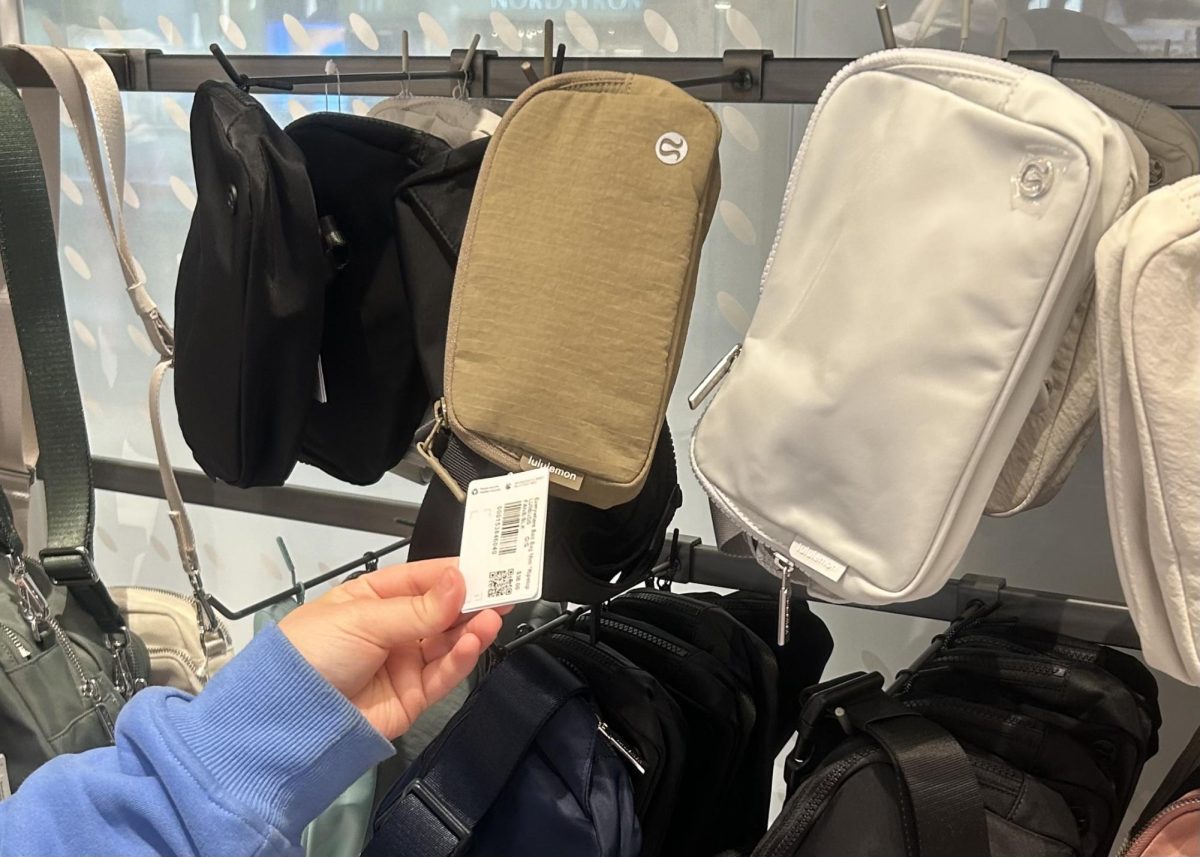
![After a thrilling point, senior Katie Byergo and junior Elle Lanferseick high-five each other on Oct. 8. With teamwork and camaraderie, Byergo worked together in the game against Lafayette High School. “[Byergo’s] is really positive with a good spirit,” Lanferseick said. “I set her [the ball] and she hits it [or] gets the kill.”](https://pwestpathfinder.com/wp-content/uploads/2025/10/DSC_9349-1-e1761159125735-1200x791.jpg)
![Focused on providing exceptional service, sophomore Darsh Mahapatra carefully cleans the door of a customer’s car. Mahapatra has always believed his customers deserve nothing less than the best. “[If] they’re trusting us with their car and our service, then I am convinced that they deserve our 100 percent effort and beyond,” Mahapatra said.](https://pwestpathfinder.com/wp-content/uploads/2025/10/DSC_0018-1200x800.jpg)
![Sophomore Aleix Pi de Cabanyes Navarro (left) finishes up a soccer game while junior Ava Muench (right) warms up for cross country practice. The two came to Parkway West High School as exchange students for the 2025-2026 school year. “The goal for the [exchange] program is to provide opportunities for both Parkway students and our international exchange students to learn about other cultures, build connections and become confident, capable, curious and caring — Parkway’s Four C’s — in the process,” Exchange Program Lead Lauren Farrelly said.](https://pwestpathfinder.com/wp-content/uploads/2025/10/Feature-Photo-1200x800.png)
![Leaning on the podium, superintendent Melissa Schneider speaks to Parkway journalism students during a press conference. Schneider joined Parkway in July after working in the Thompson School District in Colorado. “My plan [to bond with students] is to get things on my calendar as much as possible. For example, being in [classes] is very special to me. I am trying to be opportunistic [meeting] kids [and] being in [the school] buildings. I have all the sports schedules and the fine arts schedules on my calendar, so that when I'm available, I can get to them,” Schneider said.](https://pwestpathfinder.com/wp-content/uploads/2025/09/IMG_5425-1200x943.jpeg)
![Gazing across the stage, sophomore Alexis Monteleone performs in the school theater. The Monteleone family’s band “Monte and the Machine” has been releasing music since 2012, but Alexis started her own solo career in 2024 with the release of her first single, Crying Skies. “My whole family is very musical, [and I especially] love writing [songs with them],” Monteleone said.](https://pwestpathfinder.com/wp-content/uploads/2025/09/DSC7463-1200x798.jpg)

![Leaping through the air, senior Tyler Watts celebrates his first goal of the season, which put the Longhorns up 1-0 against the Lafayette Lancers. Watts decided to play soccer for West for his last year of high school and secured a spot on the varsity roster. “[Playing soccer for West] is something I had always dreamed of, but hadn’t really had a good opportunity to do until now. It’s [really] fun being out [on the field], and I’m glad I decided to join the team. It’s just all about having fun with the boys and enjoying what time we have left together,” Watts said.](https://pwestpathfinder.com/wp-content/uploads/2025/09/DSC_1951-1200x855.jpg)


![Pitching the ball on Apr. 14, senior Henry Wild and his team play against Belleville East. Wild was named scholar athlete of the year by St. Louis Post-Dispatch after maintaining a high cumulative GPA and staying involved with athletics for all of high school. “It’s an amazing honor. I feel very blessed to have the opportunity to represent my school [and] what [it] stands for,” Wild said.](https://pwestpathfinder.com/wp-content/uploads/2025/05/unnamed-6-1200x714.jpg)
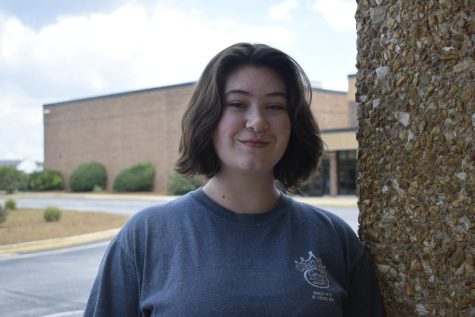
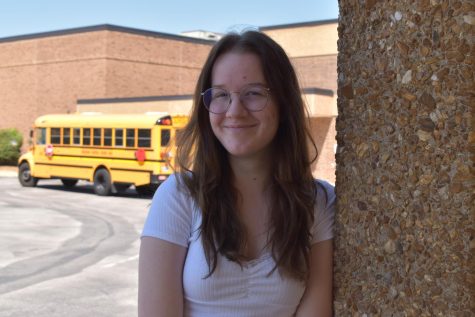
Emily • Apr 19, 2022 at 3:01 pm
Beautiful story, Madi
Elle Rotter • Apr 19, 2022 at 11:31 am
This is an amazing article Madi! You have such a strong voice and I loved getting to read about this. Great work!
Katie Wallace • Apr 19, 2022 at 10:26 am
This is incredible Madi! Not only is this super well written, but it is also an extremely interesting topic that you seem to be super knowledgeable about.